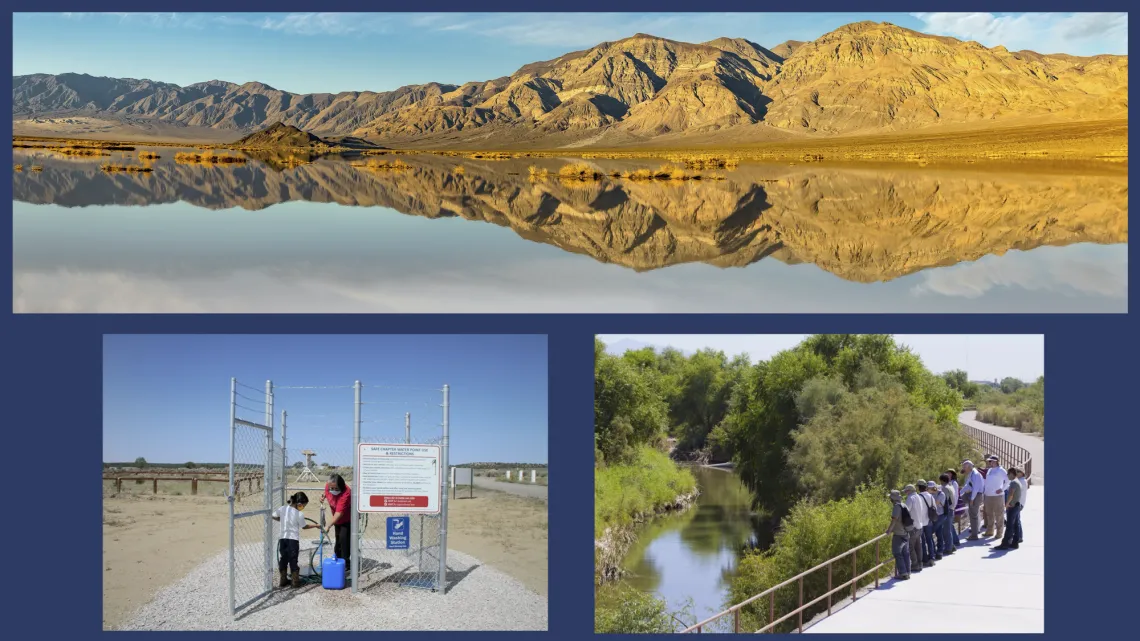CCASS Co-hosts Water Solutions for Our Warmer World Series

In collaboration with the Water Resources Research Center (WRRC) and the Udall Center for Studies in Public Policy, CCASS led the first three of a six part public series this spring to explore solutions to ecological, social, and economic challenges in which water plays a key role. The UArizona, with a long history of partnering its own experts in water-related research and policy with those from organizations throughout the region, is helping to build water-related resilience at multiple scales. Through the series, the Arizona Institutes for Resilience (AIR) is inviting the community to engage with the top minds in western water to explore regional water-related challenges and solutions.
Summary of Episode 1, Perspectives on Regional Water Sustainability
The first session, “Perspectives on Regional Water Sustainability,” brought together an engaging panel from diverse backgrounds to discuss questions such as “How should we define water sustainability,” “What does sustainability look like in the Colorado River Basin,” and “What are the paths forward for more inclusive solutions?” The session moderator, Kathy Jacobs, began by highlighting the importance of context in water management, not only in terms of geographic, economic, and policy conditions but also the diversity of lenses through which we all view water sustainability. Then, each panelist provided their personal definition of “sustainability” to frame the discussion. The panelists included WRRC Director Sharon B. Megdal; Kathryn Sorensen, Director of Research at the Kyl Center for Water Policy at Morrison Institute; Haley Paul, Policy Director for the National Audubon Society in Arizona; former Mexican Commissioner for the IBWC Roberto Salmón Castelo; and Tim Thomure, Director of Tucson Water and City of Tucson's Assistant City Manager. Chairman Timothy Williams of the Fort Mojave Indian Tribe provided the last statement, leaving the audience with a striking image of what inclusion in water management could look like: “Imagine,” Chairman Williams said, “if we could have all the flags of the states and the federal government, and all of the tribes of the upper and lower basins represented at the next signing of a Colorado River agreement…That’s when we are talking about inclusion.”
Summary of Episode 2, Water and COVID-19 in Indian Country
On Wednesday, April 21, a panel of Indigenous leaders and experts shared their experience and lessons learned about the intersection of water, energy, culture and health in “Water and COVID-19 in Indian Country”. This event was moderated by Regents Professor Toni Massaro, former dean of the UA Law School.
The opening talk by Karletta Chief, Associate Professor and Extension Specialist at UArizona, highlighted the work of Indigenous scholars and researchers in mapping COVID-19 infections on Native Nations and its correlation with the lack of indoor plumbing in infected households. Chairwoman Gwendena Lee-Gatewood of the White Mountain Apache Tribe described the reality of declining water quality in Indian Country, and commented, “It has taken a national pandemic to expose the drinking water crisis in Indian country, but we will keep fighting to secure a clean and reliable water supply for our members.” Navajo Nation President Jonathan Nez pointed out that specialized medical care is underfunded on the reservation. On a positive note, President Nez noted the success of the Navajo vaccination effort, stating that more than half of the Navajo people have been fully vaccinated. Otakuye Conroy-Ben, Assistant Professor at Arizona State University's School of Sustainable Engineering and the Built Environment, shared her work examining COVID-19 in wastewater from Indigenous communities. Beatrice Norton, Board Chair of the Oraibi, AZ Hopi village, reported about the help they received from the CARES Act and the Indian Health Services to fund water tanks and trailers to transport water to houses. Crystal Tulley-Cordova, Principal Hydrologist of the Water Management Branch at the Navajo Nation Department of Water Resources, emphasized the need for water infrastructure capital development and financial support for system maintenance.
Summary of Episode 3, The Realities of Adaptation in the Water Sector
On May 19, 2021, the third episode in the series was moderated by Andrea Gerlak from the Udall Center for Studies in Public Policy and School of Geography, Development & Environment. Keynote speaker Lester Snow, former secretary of the California Natural Resources Agency, noted his frustration with the pace of adaptation relative to investments in managing emissions. “While we’ve seen many changes, we’re still managing through the lens of authorizing legislation and institutions created in the ‘50s, ‘60s, and ‘70s when we didn’t talk about rapid climate change,” Snow said. “That has to change as we move forward.”
The panelists for this episode – Governor Steven Roe Lewis of the Gila River Indian Community, Dr. Jeff Arnold of the Corps of Engineers, Colby Pellegrino from Southern Nevada Water Authority, and Emily Wasley from the consulting firm WSP – responded to the keynote and audience questions with their thoughts on adaptation and solutions for water resources.
The panelists emphasized that water management must be more durable, inclusive and flexible in order to address the challenges ahead. Additionally, adaptive management strategies must shift from a scientific lens to a strong foundation in governance and policy in order to create water equity.
“Tribal Nations until recent times have not been part of the solution or the discussion,” Governor Lewis said. “It’s important to have all partners at the table. Tribal Nations have a depth of knowledge about the natural world and that can be employed very effectively to ensure a very holistic approach to climate change and adaptation is realized.”
These summaries are based on material developed for The Wave, a WRRC publication, and for the AIR website.
Click here to visit the series website
Photography credits
Episode 1: "Perfect Reflection" by Adriana Greisman, Death Valley, 2017; WRRC Photo Contest 2020
Episode 2: "Family Pandemic Adaptions" by Nikki Tulley, Navajo Nation, 2020; WRRC Photo Contest 2020
Episode 3: Photo courtesy of Pima County, Santa Cruz River near Cortaro Farms Road, 2014

